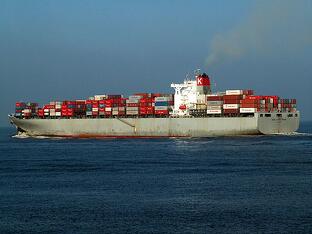In a classic stand-up bit, Chris Rock says, “I love rap music, but I’m tired of defending it.” He went on to divulge his love for the musical genre but his inability to defend lyrics like “to the window, to the wall, till the…” Well, you know the rest. (If you don’t know it, you can check out the lyrics to “Get Low” by Lil Jon and East Side Boyz. Suffice it to say it wouldn’t be appropriate to print the lyrics here.)
Chris Rock’s position is one I imagine we often find ourselves in – loving/buying/enjoying/doing something but having trouble defending it or feeling guilty for its impact. Example: giving babies lemonade. They discover it tastes great, they smile and gesture for more, and so you spoon more of the sweet-sour concoction into their little expectant baby-bird mouths. But you know you shouldn’t. “It’s home-made lemonade,” you tell yourself, “I know exactly how much refined white sugar my baby is eating!” And the justifications continue.
 An example for the non-parents out there: downloading Justin Bieber music. “I shouldn’t like this,” you tell yourself. “This kid doesn’t know a thing about real love or real music!” But you do buy it. And you download it onto your iPod (at least my wife does and I hope she has some remorse for it). Perhaps I should have gone with a fast food example here, but maybe you love Justin Bieber or kitten videos or Twilight films or reading Hitler biographies… Whatever it is it’s your thing, but it is draining to have to defend that love.
An example for the non-parents out there: downloading Justin Bieber music. “I shouldn’t like this,” you tell yourself. “This kid doesn’t know a thing about real love or real music!” But you do buy it. And you download it onto your iPod (at least my wife does and I hope she has some remorse for it). Perhaps I should have gone with a fast food example here, but maybe you love Justin Bieber or kitten videos or Twilight films or reading Hitler biographies… Whatever it is it’s your thing, but it is draining to have to defend that love.
Usually I don’t.
Sometimes I blog about “green” shipping as there have been many new practices, policies, and technological advances to reduce the environmental impact of international shipping over the last several years.
So, when you work in the international shipping industry, perhaps for a freight forwarder like Universal Cargo Management, and you are grateful for the income they provide you and feel a certain pride of being part of an industry that’s hugely beneficial to the economy, you don’t want to feel like you have to defend that industry. Not current international shipping practices and certainly not international shipping for all time.
International shipping is like most industries in that an increased awareness about the need to protect the environment and the impact the industry has had on it has lead to change and innovation to be more green and eco-friendly.
I was watching a video from a United Nations Conference on Climate Change in which a scientist made the statement that the international shipping industry is “dirty”. She didn’t mean it’s riddled with corruption. She went on to clarify that international shipping is responsible for a lot of pollution, especially pollution that contributes to global warming.[1]
There it was, that feeling after I give my baby lemonade. But the international shipping industry still takes a great deal of criticism when it comes to the topic of being green or eco-friendly.
 Despite what I’d like to think, I cannot call myself an unbiased reporter. After all, I work for a freight forwarding company in the international shipping industry and I’m a blogger not a reporter.
Despite what I’d like to think, I cannot call myself an unbiased reporter. After all, I work for a freight forwarding company in the international shipping industry and I’m a blogger not a reporter.
But I do care about the environment in the sense that I recycle and remember to bring my own bags to the grocery store 50% of the time and don’t want to die of the mini-ice age depicted in several disaster films I’ve seen. So I don’t exactly like to hear that the international shipping industry, the industry I work in, is a “dirty” business in the sense that it’s such a major contributor of environmental pollutants.
As I mentioned above, I have written about measures the international shipping industry has taken to significantly reduce its contribution to pollution, so writing about a scientist calling the international shipping industry dirty may come as a surprise. You’d think I’d be writing about the International Maritime Association’s work to continuously improve the international shipping industry’s environmental impact.
Well, you’re right.
The scientist calling the international shipping industry “dirty” caused me to go into research mode. The first thing I discovered was that she (the scientist) was not actually credited as a scientist but rather a representative of Oxfam, an international humanitarian organization dedicated to helping the impoverished.
Still, who was I going to trust about the international shipping industry, the Oxfam rep or the International Maritime Organization’s website? My first inclination was to trust the Oxfam rep. As an outside observer of the international shipping industry who cares about the environment, she might be less biased.
My next thought was to check out who’s behind the International Maritime Organization. It turns out they are an international organization dedicated to “Safe, secure and efficient shipping on clean oceans.”[2] They care about the environment too according to their website. And they care about international shipping.
I read some reassuring facts and viewed some equally reassuring charts about the improvements in international shipping. I looked further and found the International Chamber of Shipping describing how the shipping industry is the “least environmentally damaging form of commercial transport.”[3] There is certainly more to say on this subject on both sides; however, it is clear that international shipping is not the scapegoat it might appear to be.
What’s crazy is 90% of all commercial goods spend time on ships. An industry that big and that important cannot simply be “good” or “bad”; instead, its impact is necessarily as complex as it is powerful. It would take more than a blog to cover all sides of the issue, but I have resolved to educate myself further about the benefits of the global shipping industry along with its criticisms and how we can reduce its environmental impact.
Anyone with me? Are you tired of defending international shipping? Do you want to see a healthy balance of the benefits and issues involved in international shipping? Let us know your thoughts in the comments section below and we’ll continue to delve into these issues in future blogs.
Click Here for Free Freight Rate Pricing
